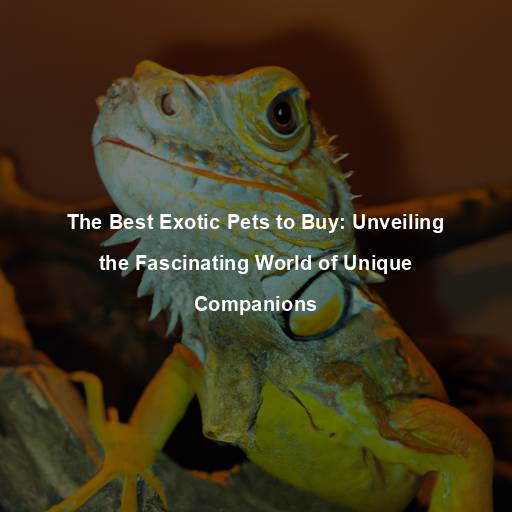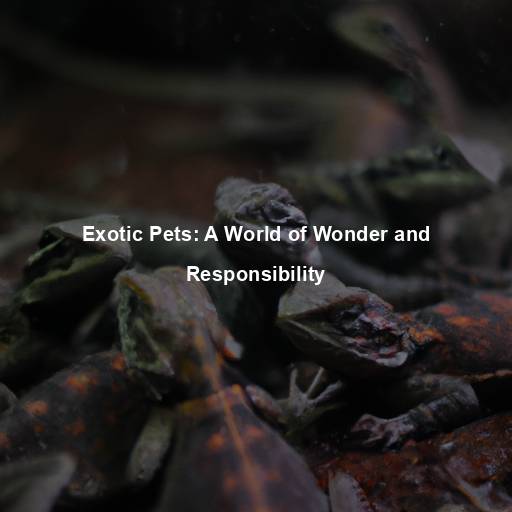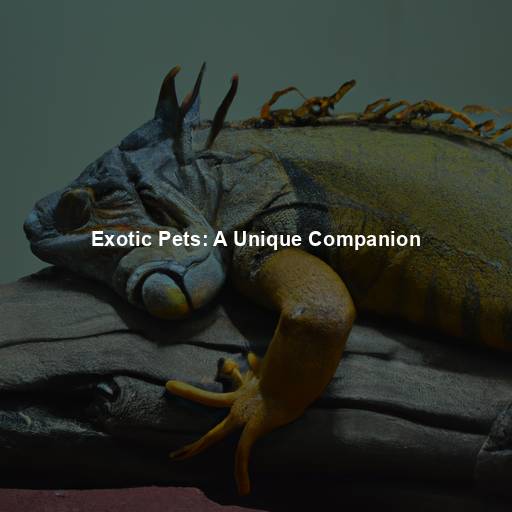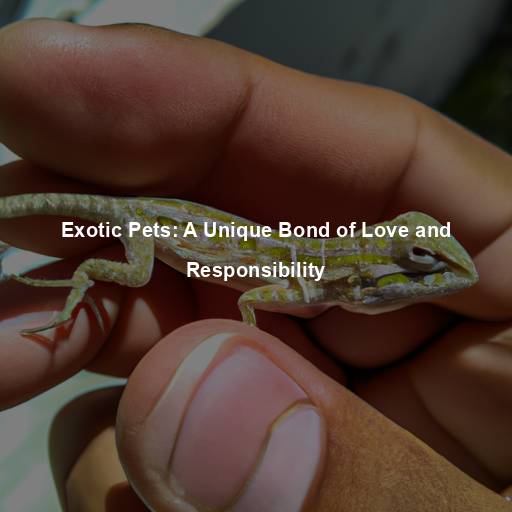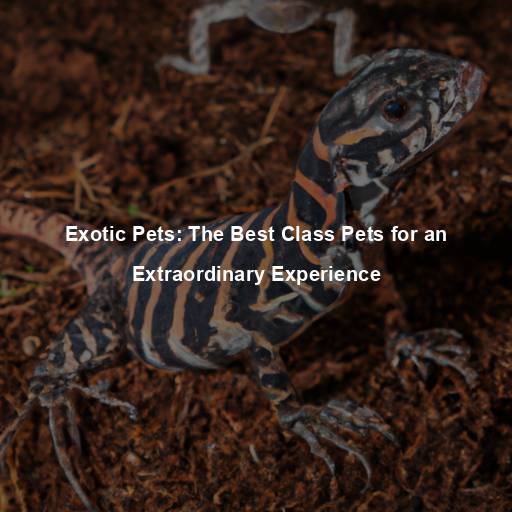Exotic Pets: A Guide to Legality in Georgia
Last Updated on July 31, 2023 by Evan
Contents [hide]
- 1 Understanding the Fascination with Exotic Pets
- 1.1 What Defines an Exotic Pet?
- 1.2 Understanding Georgia’s Laws on Exotic Pets
- 1.3 Exotic Pets and the Georgia DNR
- 1.4 Prohibited Exotic Pets in Georgia
- 1.5 Restricted Exotic Pets in Georgia
- 1.6 Exempted Exotic Pets in Georgia
- 1.7 Understanding the Permit Process
- 1.8 Navigating the Responsibility of Exotic Pet Ownership
- 1.9 Reptiles as Exotic Pets
- 1.10 Birds as Exotic Pets
- 1.11 Mammals as Exotic Pets
- 1.12 The Appeal of Exotic Pets
- 1.13 Navigating the Legal Landscape
- 1.14 Meeting the Unique Needs of Exotic Pets
- 1.15 The Ethical Responsibility of Exotic Pet Ownership
- 2 FAQs: What Exotic Pets Are Legal in Georgia?
- 2.1 What is considered an exotic pet in Georgia?
- 2.2 Are there any restrictions on owning exotic pets in Georgia?
- 2.3 Can I own a venomous snake as a pet in Georgia?
- 2.4 Is it legal to keep big cats or primates as pets in Georgia?
- 2.5 Can I own an exotic bird as a pet in Georgia?
- 2.6 Are there any specific rules for owning exotic reptiles in Georgia?
- 2.7 Where can I find more information about owning exotic pets in Georgia?
Understanding the Fascination with Exotic Pets
Exotic pets have always captivated the human imagination. From the majestic beauty of a Bengal tiger to the playful antics of a capuchin monkey, these unique animals possess an allure that is hard to resist. However, before embarking on the journey of owning an exotic pet, it is essential to understand the legalities surrounding their possession and ownership. In this comprehensive guide, we will explore the legal framework for exotic pets in the state of Georgia.
What Defines an Exotic Pet?
When we talk about exotic pets, we refer to animals that are not typically domesticated or commonly found in households. These animals often come from different parts of the world and require specialized care due to their unique needs and behaviors. Examples of exotic pets include reptiles like snakes and iguanas, birds such as parrots and macaws, as well as mammals like hedgehogs and sugar gliders.
Understanding Georgia’s Laws on Exotic Pets
Did you know that owning exotic animals in the United States can be a real maze? With every state having its own unique set of regulations, it’s easy to get lost in the complexity. Georgia, for instance, entrusts the Department of Natural Resources (DNR) with the task of keeping a sharp eye on these laws. So, if you’re an aspiring owner, make sure to dive deep into the world of regulations to ensure both the safety of these magnificent creatures and your own compliance.
Exotic Pets and the Georgia DNR
Discover the intriguing realm of exotic pets in Georgia with the ultimate guide provided by the Georgia DNR. Uncover the enigma as this comprehensive list unveils the mysterious creatures that are classified as either prohibited, restricted, or granted exemption within the state. Dive into the abyss of regulations and navigate the complex landscape of acquiring an exotic pet in Georgia by consulting this essential and bewildering compendium.
Prohibited Exotic Pets in Georgia
Certain animals are entirely prohibited as pets in Georgia due to safety concerns, ecological impact, or potential threats to public health. These include large carnivores like lions, tigers, and bears, as well as primates such as chimpanzees and gorillas. The rationale behind these prohibitions is to protect both the animals and the community from potential harm.
Restricted Exotic Pets in Georgia
While some animals are prohibited outright, others fall under the category of restricted exotic pets. These animals may be permitted under specific circumstances, such as obtaining a permit or meeting certain criteria. Primarily, the Georgia DNR aims to ensure that individuals possessing restricted exotic pets have the knowledge, experience, and resources to care for these animals properly. Examples of restricted exotic pets in Georgia include certain species of venomous snakes, crocodilians, and large constrictor snakes.
Exempted Exotic Pets in Georgia
Georgia’s regulations on exotic pets may leave some feeling befuddled, as not all species fall under the same scrutiny. Perplexingly enough, certain animals are exempt from permit requirements, allowing them to be kept as pets without legal obstacles. Bursting with curiosity, one might wonder which species have been deemed less risky to public safety and the environment. Surprisingly, this list may include diminutive reptiles like select gecko species, or even pint-sized mammals such as chinchillas and ferrets.
Understanding the Permit Process
If you’ve ever dreamt of having an extraordinary creature as a pet, navigating the intricate web of regulations can be a real head-scratcher. In Georgia, owning a restricted exotic pet requires a permit, and let me tell you, it’s quite the ordeal. Picture this – filling out lengthy applications, divulging every minute detail about the animal you fancy, and proving beyond a shadow of a doubt that you can meet its every whim and fancy. The Georgia DNR takes this task seriously, scrutinizing each application with hawk-like precision to ensure the hopeful owner has the expertise and resources required to care for their unusual companion.
Owning a unique and unconventional pet brings a whirlwind of obligations and thoughtful considerations that demand our attention. Amidst a world of legal intricacies, it becomes imperative to embrace the profound and enduring commitment that comes with these extraordinary creatures. Delving into the abyss of their peculiar dietary preferences, intricate environmental requirements, and peculiar behavioral patterns, lays the challenge of ensuring their utmost wellness. Prospective owners must embark on an expedition of extensive research and profound education, immersing themselves in the intricate maze of knowledge surrounding their desired exotic companion, making informed decisions that will shape their lives and the lives of these extraordinary beings.
Reptiles as Exotic Pets
Reptiles are a popular choice for exotic pet enthusiasts in Georgia. However, it is crucial to understand the specific requirements and considerations for owning reptiles before bringing them into your home.
Snakes
Snakes are fascinating creatures that require specialized care and attention. In Georgia, certain species of venomous snakes, such as rattlesnakes and copperheads, are restricted and can only be owned with a permit. It is essential to research the specific regulations regarding venomous snakes and ensure compliance with the permit process.
When it comes to non-venomous snakes like corn snakes or ball pythons, thankfully, no permit is needed. But that doesn’t mean we can let our guard down. These scaly creatures deserve a comfortable home with the right enclosures, temperature variations, and a balanced diet. Responsible ownership means being vigilant about their health by scheduling regular vet check-ups and staying informed about the unique needs of each snake species.
Iguanas and Other Lizards
Iguanas and other lizards can make captivating exotic pets, but they require a significant investment of time, space, and resources. Green iguanas, for example, can grow quite large and need a spacious enclosure with access to both heat and UV light sources. Proper nutrition, including a variety of fresh vegetables and fruits, is crucial for their health.
Georgia is home to a variety of lizard species that captivate reptile enthusiasts. From the charismatic bearded dragons and leopard geckos to the captivating anoles, each lizard possesses its own distinct set of care demands. Adhering to precise temperature and humidity levels, providing suitable substrate, and ensuring a balanced diet are pivotal factors to consider when delving into the realm of exotic pet ownership. Embarking on thorough research and comprehending the unique necessities of the lizard species you intend to keep will pave the way for a harmonious and fulfilling companionship.
Birds as Exotic Pets
Birds have been cherished as exotic pets for centuries, captivating us with their vibrant colors and melodious songs. However, owning a bird as a pet requires careful consideration and a commitment to their well-being.
Parrots and Macaws
Parrots and macaws are popular choices for bird enthusiasts in Georgia. These intelligent and social creatures require mental stimulation, regular social interaction, and a spacious environment. It is essential to provide them with a varied diet that includes fruits, vegetables, and specially formulated pellets.
Responsible ownership of parrots and macaws also includes routine veterinary care, as they are susceptible to certain health issues. Potential owners should be prepared for the long-term commitment that comes with these magnificent birds, as they can live for several decades.
Cockatiels and Lovebirds
Searching for avian companions that come in petite packages? Look no further than the delightful cockatiels and lovebirds. These charming creatures are adored for their affectionate demeanor and mischievous tendencies. Create a cozy haven for your cockatiel with a roomy cage adorned with toys and perches aplenty, while lovebirds thrive in the company of a partner or a close-knit flock.
Both cockatiels and lovebirds have specific dietary requirements that include a mix of seeds, pellets, and fresh fruits and vegetables. Regular interaction and mental stimulation are also crucial for their well-being. It is important to research the specific needs of these bird species and provide them with a nurturing and stimulating environment.
Mammals as Exotic Pets
Owning a mammal as an exotic pet can be an exhilarating and heartwarming experience, bringing a whole new level of companionship and joy into your life. However, it is crucial to delve into the intricate world of mammalian ownership, acquainting yourself with their distinct needs and considerations, before welcoming them into the cozy confines of your home. By unraveling the enigmatic intricacies of mammal care, you’ll ensure a harmonious and fulfilling relationship with these enchanting creatures. So, embark upon this perplexing journey of mammalian companionship, and unlock the secrets that will allow you to forge an unbreakable bond with these extraordinary pets.
Hedgehogs
Lately, the enchanting world of hedgehogs has captured the hearts of many, turning them into sought-after exotic companions. The undeniable appeal lies in their captivating looks and the ease of caring for these petite nocturnal creatures. Providing a safe haven rich in hidden nooks and crannies to satisfy their curious souls is crucial, while ensuring a nutritional balance through a carefully crafted diet of specialized hedgehog sustenance, complemented by delectable insects and occasional fruity indulgences is vital to their well-being.
Hedgehogs require regular exercise and mental stimulation, such as providing them with tunnels and toys. It is important to handle them gently and provide proper veterinary care to ensure their well-being.
Sugar Gliders
Sugar gliders are small, social marsupials that have become increasingly popular as exotic pets. These energetic creatures require a large enclosure with plenty of vertical space for climbing and gliding. It is important to provide them with a balanced diet that includes a mix of fresh fruits, vegetables, insects, and specially formulated sugar glider food.
When it comes to sugar gliders, socializing is an absolute game-changer! These lively creatures are all about the buddy system, flourishing in the company of their fellow sugar gliders or even their adoring human companions. The key to unlocking their ecstatic little hearts lies in daily quality time, where bonding becomes as crucial as a sugar rush. Dive deep into their world, getting to know their unique requirements, because a happy sugar glider is a glorious sight to behold!
The Appeal of Exotic Pets
There is an undeniable mystique and fascination that surrounds owning exotic pets – the chance to have a piece of the wild under our roofs. However, it is crucial that we approach this adventure with a combination of awe and restraint. Exotic pet ownership is a complex field, tangled with legal regulations and ethical dilemmas, demanding careful thought and responsible actions.
Understanding the Fascination
The allure of exotic pets can be attributed to a multitude of captivating factors. These creatures possess an enchanting allure, boasting mesmerizing physical traits that speak to their innate uniqueness. Their vivid hues and intricate patterns set them apart from the conventional furry friends we are accustomed to. Moreover, their intriguing behaviors and adaptations leave pet owners perplexed yet intrigued, as they navigate the intricate mysteries of the animal kingdom.
In a world where individuality reigns supreme, the allure of owning an exotic pet cannot be denied. These extraordinary creatures bring an element of mystique and peculiarity to our lives, allowing us to make a distinctive mark in a sea of conformity. Nonetheless, amidst the excitement and fascination, we mustn’t forget that these beautiful beings have intricacies that demand our utmost attention and care, for their happiness and welfare to thrive.
When it comes to introducing an extraordinary companion into your life, it’s crucial to embark on a deep exploration of the legal landscape that governs the ownership of such unique creatures, tailored to your distinct locale. In the vibrant terrain of Georgia, the Department of Natural Resources (DNR) takes center stage in the magnificent saga of overseeing and enforcing these intricate regulations. Prepare to delve into a world of enchantment and perplexity as you navigate the captivating realm of exotic pet ownership in the mesmerizing state of Georgia.
Protecting Wildlife and Ecosystems
The primary purpose of these regulations is to protect both the animals themselves and the ecosystems in which they naturally exist. Many exotic pets are not native to the region and can pose a threat to local wildlife and ecosystems if released or escaped into the wild. By establishing laws and guidelines, the DNR aims to minimize these risks and ensure the preservation of Georgia’s natural habitats.
Prohibited Species
Certain species are entirely prohibited as pets in Georgia due to safety concerns, ecological impact, or potential threats to public health. This includes large carnivores like lions, tigers, and bears, as well as primates such as chimpanzees and gorillas. The ban on these species is essential to safeguard both the animals and the community from potential harm.
Restricted Species and Permits
When it comes to exotically captivating pets, there’s a whole realm of enchantment awaiting, albeit with a twist. These mesmerizing creatures may fall under the category of “restricted species,” where acquiring ownership isn’t a walk in the park. It’s like embarking on a journey filled with intriguing challenges, as one must navigate through the maze of permits and stringent requirements to prove their competence in catering to every unique need of the animal they seek to embrace.
The goal of requiring permits is to ensure that individuals possessing restricted exotic pets have the knowledge, experience, and resources necessary to provide proper care. The Georgia DNR carefully reviews each permit application to assess the applicant’s qualifications and commitment to responsible ownership.
Exempted Species
Exploring the fascinating world of exotic pets in Georgia offers a bewildering mix of regulations and exemptions. Unraveling the enigma, certain species dance through the loopholes of permit requirements, posing a seemingly lesser risk to the public and the environment. Delving deeper into this mysterious realm reveals that diminutive reptiles like geckos, adorned with their unique hues, escape the clutches of red tape alongside petite mammals such as chinchillas and ferrets. Yet, amidst this tangled web of exceptions, the importance of conscientious stewardship remains an imperative thread that weaves through the tapestry of responsible ownership.
Meeting the Unique Needs of Exotic Pets
When it comes to owning an exotic pet, there’s a lot more than meets the eye. It’s not just about being captivated by their stunning looks or intriguing behavior. It’s about diving deep into their world, understanding their unique needs, and going the extra mile to ensure their utmost well-being and happiness.
Education and Research
When it comes to inviting an uncommon creature to share your living space, being well-informed is a non-negotiable necessity. Embarking on a journey of diligent exploration, whereby you delve deep into the mysterious realms of their natural habitat, dietary preferences, and intricate social dynamics, will undoubtedly pave the way for a harmonious coexistence. By arming yourself with this indispensable knowledge, you lay the foundation for crafting an environment that caters to both their physical well-being and enigmatic psychological needs.
In this ever-evolving world of exotic pet ownership, exploring various avenues of expertise is paramount. Tapping into the wealth of knowledge offered by seasoned veterinarians who specialize in these unique companions, or seeking guidance from experienced exotic pet enthusiasts, can prove to be an invaluable asset. Additionally, immersing oneself in online communities or local exotic pet clubs can offer a rich tapestry of support and a space to exchange a treasure trove of wisdom.
Physical and Environmental Considerations
Exotic pets often have unique physical and environmental needs that must be met for their well-being. This includes providing appropriate enclosures or habitats that mimic their natural environment, ensuring proper temperature and humidity levels, and offering a varied and balanced diet.
When it comes to providing an optimal living environment for our beloved pets, the diversity of their needs can sometimes leave us scratching our heads in perplexity. Take reptiles, for instance, with their picky requirements for heating and lighting arrangements that keep us on our toes. And let’s not forget about our feathered friends who demand roomy cages filled with a plethora of toys and perches to keep their curious minds constantly engaged. As for our cuddly mammals like hedgehogs and sugar gliders, their specialized enclosures, complete with cozy hiding spots and the perfect bedding materials, can leave us in a frenzy of research and decision-making.
Socialization and Mental Stimulation
Owning an exotic pet can be an exciting adventure. However, it’s important to note that these unique companions often have complex needs that extend beyond basic care. For instance, parrots and macaws, known for their remarkable intelligence, crave social interaction and thrive on bonding with their human caregivers. To provide these feathered friends with a fulfilling life, incorporating regular interaction, engaging enrichment activities, and interactive training sessions can help satisfy their intricate mental and social requirements.
When venturing into the realm of extraordinary pets, like sugar gliders or specific primates, it becomes imperative to acknowledge their unique social needs and yearning for companionship within their own species. To ensure their well-being, it is paramount to delve into research concerning the intricate social dynamics of the chosen species and offer ample opportunities for socialization. Dive into the perplexing world of exotic pets, and unlock the secrets to their enchanting social lives.
The Ethical Responsibility of Exotic Pet Ownership
While the desire to own an exotic pet may be fueled by fascination and a love for animals, it is crucial to recognize the ethical responsibilities that come with their ownership.
Consider the Animal’s Well-being
The well-being of the animal should always be the primary concern. Exotic pets have specific needs that must be met for them to thrive physically and mentally. It is essential to provide appropriate housing, nutrition, veterinary care, and mental stimulation to ensure their overall health and happiness.
Avoid Impulse Purchases
Impulse purchases should be avoided when it comes to exotic pets. It is crucial to carefully consider the long-term commitment that comes with owning an exotic animal. Many exotic pets have long lifespans, and their care requirements may change over time. Understanding the level of dedication, time, and financial resources required is essential before making the decision to bring an exotic pet into your life.
Responsible Breeding and Adoption
Responsible breeding and adoption practices are vital to ensure the welfare of exotic pets. If you decide to obtain an exotic pet from a breeder, it is important to research the breeder’s reputation and ensure they follow ethical practices. Alternatively, adopting from reputable rescue organizations or shelters can provide a loving home to animals in need.
Support Conservation Efforts
FAQs: What Exotic Pets Are Legal in Georgia?
What is considered an exotic pet in Georgia?
In Georgia, an exotic pet typically refers to any type of non-domesticated animal that is not traditionally kept as a companion animal. This can include various reptiles, amphibians, birds, certain primates, small mammals such as some species of skunks or foxes, as well as large cats like tigers, lions, and leopards.
Are there any restrictions on owning exotic pets in Georgia?
Owning exotic pets in Georgia comes with a twist of regulations to uphold safety and preserve the harmony between creatures and community. The state enforces certain permits and licenses for some exotic animals, while others are a hard no. Prospective pet owners in Georgia must delve deep into the intricacies of the state’s laws and guidelines on exotic pet ownership – a maze that demands thorough research and understanding.
Can I own a venomous snake as a pet in Georgia?
Owning venomous snakes is generally not allowed in Georgia. The state’s laws prohibit the possession of highly venomous snakes, such as rattlesnakes, cottonmouths, and copperheads, without special permits. However, certain non-venomous snake species may be allowed as pets, subject to local regulations. It is crucial to consult with state and local authorities to ensure compliance with all applicable laws and safety requirements.
Is it legal to keep big cats or primates as pets in Georgia?
The ownership and possession of big cats, including lions, tigers, leopards, or any hybrid of these species, is strictly regulated in Georgia. It generally requires specific permits or licenses, and in some cases, they may be prohibited altogether. Keeping primates as pets also falls under similar restrictions and often necessitates permits due to the potential risks associated with these animals. It is important to contact the Georgia Department of Natural Resources or local animal control for detailed information regarding the ownership of big cats or primates.
Can I own an exotic bird as a pet in Georgia?
Yes, owning exotic birds, such as parrots, macaws, or cockatoos, is legal in Georgia. However, it is important to note that certain species of birds may be protected under federal or state laws, and additional permits may be required to possess them legally. It is advisable to consult with relevant authorities or wildlife agencies to ensure compliance with applicable regulations and to provide the best possible care for these birds.
Are there any specific rules for owning exotic reptiles in Georgia?
Owning exotic reptiles, including snakes, lizards, and turtles, is generally allowed in Georgia. However, some species of reptiles may require permits or licenses for ownership, especially if they are endangered or listed as protected wildlife. Moreover, there might be specific regulations regarding the enclosure size, housing conditions, and potential danger associated with certain species. It is essential to research and adhere to the state and local regulations to ensure both the welfare of the reptiles and compliance with the law.
Where can I find more information about owning exotic pets in Georgia?
If you’re looking to know the nitty-gritty details about owning exotic pets in Georgia, it’s wise to reach out to the Georgia Department of Natural Resources, local animal control agencies, or wildlife management authorities. These folks have the skinny on what species are allowed, what permits you need, how to build the right crib for your critter, and other must-know stuff for being a responsible exotic pet parent in the Peach State. Trust me, these guys are the gurus of the exotic pet game in Georgia! So, don’t hesitate to hit them up for some enlightening and intriguing info.



